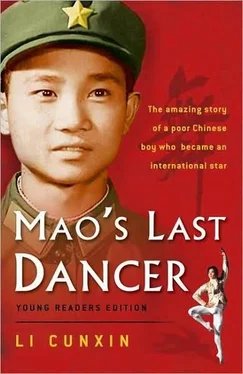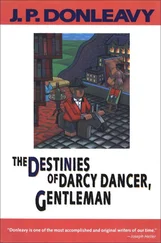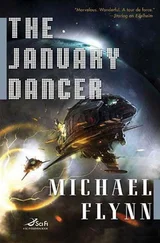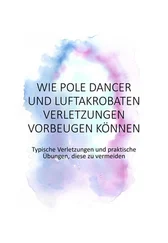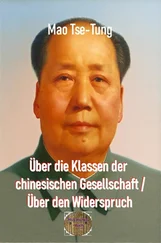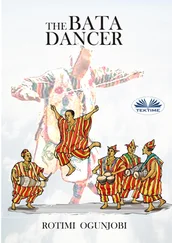But the toilet smell wasn't the only smell we had to contend with at their place. My grandparents both chain-smoked pipes and their two tiny rooms were constandy filled with smoke. Luckily we never stayed inside long. In fact we always made sure we didn't by making lots of noise while the adults were talking. Sometimes our grandfather would tell our niang to control her "undisciplined brats". But we never really got into trouble. Niang was just as relieved as we were to leave that stinking, miserable place.
Our second stop on that trip was at our niang's eldest brother's house, Big Uncle's. He was three years younger than her and they were very close. Big Uncle was the most educated man in our niang's family. He was politically astute, and the head of the propaganda department for the Building Materials Bureau in Qingdao. He had a son and two daughters. Their living standard was much higher than ours: we considered their three-room apartment very luxurious.
Big Uncle loved card games and also enjoyed playing a word guessing game between the adults. The loser had to keep drinking rice wine, and the more they drank the more likely they were to lose. All the children would form a circle, cheering the adult they wanted to succeed.
"I won! Drink! Drink!" Big Uncle would declare.
"Shui shuo ni ying le? Zailai, zailai!" The opponent wouldn't agree with Big Uncle's declaration, and they would get into heated arguments. Often they were shouting so loud the women had to ask them to quieten down. Afterwards I would ask Big Uncle what story each word represented, and sometimes he would tell me a famous fable. He was an animated storyteller, humorous and witty. I thought maybe that was why he was head of the propaganda department.
The fifteenth day of the New Year was always dreaded. It marked the end of the Chinese New Year and the beginning of our harsh life once again. We were told this night was traditionally enjoyed by the emperor's family as the "Night of Lights". Beijing and other big cities would display magical lights and set off many fireworks. But the best we could do was to make torches from can-dlewax. We would walk around the house and shine the torches into every corner to keep the evil spirits away. Our fourth uncle always took huge pleasure in making the torches for us. We gathered wooden sticks and he would wrap pieces of white cotton tightly around the tip and dip them into a big pot of melted candlewax. Sometimes he even let us do some dipping if we behaved ourselves. I loved watching the wax harden on the tip of the sticks, and even more I enjoyed running and twisting the torch around, making different shapes in the dark. My favourite shape to make was a dragon, and I pretended my torch was a magical Kung Fu weapon as I twirled it around.
Our parents always warned us to keep the torches away from the piles of dried grass or hay which were used to ignite the coal and which every family stored in their front yard. Once I remember a neighbour's house nearly caught fire because a five- year-old boy hid in their haystack with a lit incense in his hand. The boy barely escaped from the burning haystack alive.
Chinese New Year was our dia's only holiday. Since the weather was normally very cold and the fields frozen at that time of the year, there was not much work to do on our little piece of land. Our main outdoor activity during these days was kite flying. I often sat myself apart from the other kite-flying boys. For them this was just another game, but for me this time was special. My kite wasn't ordinary. It was my messenger to the gods, my secret communication channel.
Our dia was an expert kite-maker. He made very simply shaped kites: a square, a six-pointed star and a butterfly. He used an ancient Chinese cutting knife, the size of a Swiss army knife, to thinly slice the bamboo sticks. Then he'd tie the corners with thread and glue rice paper over the frame. To counter the weight we would hang long strips of cloth on the tail. The kite string was pieced together from anything we could find.
I adored making kites with our dia. This was one of the few playful times I could have with him. He would take us up to the fields on the Northern Hill and he'd sit next to me and tell me stories from his childhood. I never wanted these special moments to end.
At this time of the year there was always thick snow in the fields. The freezing, howling wind felt like small sharp knives cutting into my skin. The fields smelt, as always, of human manure. My dia would help my kite into the sky, then stand up, ready to leave. "Are you all right now? I'm going home. I've got work to do."
"Dia, can you tell me a story before you go?"
"I've told you all the stories I have."
"Please tell me `The Frog in the Well` story again," I begged. He sat next to me, put his arm around my shoulder, and began:
There was a frog that lived in a small, deep well. He knew nothing but the world he lived in. His well and the sky he could see above it were his entire universe. One day he met a frog who lived in the world above. "Why don't you come down and play with me? It's fun down here," the frog in the deep well asked. "What's down there?" the frog above asked. "We have everything down here. You name it. The streams, the undercurrent, the stars, the occasional moon, and we even get flying objects coming down from the sky sometimes," the frog in the well answered. The frog on the land sighed. "My friend, you live in a confined world. You haven't seen what's out here in the bigger world." The frog below was very annoyed. "Don't you tell me that you have a bigger world than ours! My world is big. We see and experience everything the world has to offer," the well frog said. "No, my friend. You can only see the world above you through the size of the well. The world up here is enormous. I wish I could show you how big it is," the frog above replied. The frog in the well was angry now. "I don't believe you! You are telling me lies! I'm going to ask my dia." He told his dia about his conversation with the frog on the land. "My son," he said with a saddened heart, "your friend is right. I heard there is a much bigger world up there, with many more stars than we can see from here." "Why didn't you tell me about it earlier?" the little frog asked. "What's the use? Your destiny is down here in the well. There is no way you can get out of here," the father frog replied. The little frog said, "I can, I can get out of here. Let me show you!" He jumped and hopped, but the well was too deep and the land was too far above. "No use, my son. I've tried all my life and so did your forefathers. Forget the world above. Be satisfied with what you have, or it will cause you such misery in life." "I want to get out, I want to see the big world above!" the little frog cried determinedly. "No, my son. Accept fate. Learn to live with what is given," his dia replied. So the poor little frog spent his life trying to escape the dark, cold well. But he couldn't. The big world above remained only a dream.
"Dia, are we in a well?" I asked.
He thought for a while. "Depends on how you look at it. If you look at where we are from heaven above, yes, we're in a well. If you look at us from below, we're not in a well. Will you call where we are heaven? No, definitely not," he replied.
I thought about that poor frog in the well many times. I felt sad and frustrated. We were all trapped in a well too, and there was no way out.
So I would use my kite to send messages to the gods. I found refuge from the freezing wind in a ditch and I carried a pocketful of small paper strips. I wet both ends of the paper with my tongue and looped it around the string of the kite. The strong wind pushed my paper loop up towards the kite.
The wish I sent up with my first paper loop was for my niang's happiness and long life. I told the gods that she was the kindest, most hardworking niang, but she was so poor and deserved better. I challenged the gods and said that if they really existed and were as powerful as people were telling me they were, then they should change my niang's situation and grant her a happy life. Suddenly I would get angry with the gods for not being fair to my niang. Then I would become frightened, and beg them for forgiveness. After that, I would send a second wish, for my dia's good health.
Читать дальше
